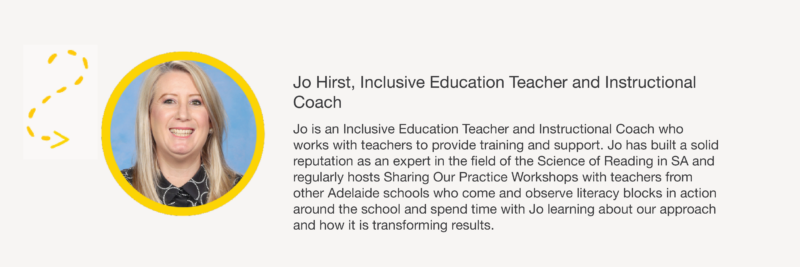Evidence-based literacy practices to provide the best outcomes for our students
Reading, spelling and writing may still be at the heart of school-based learning, but for many parents, the way our children are learning today is very different to how we were taught.
At St Peter’s Woodlands we are committed to implementing evidence-based teaching practices and ensuring our teachers are supported to develop the knowledge and skills necessary to teach effectively.
Jo Hirst, our Instructional Coach, is a key part of achieving this goal. She works closely with teachers across the school to share the latest research-based practices and to support them to implement these into their classrooms. Jo is committed to continuing to learn all she can to ensure that every student at SPW has access to the best literacy instruction.
“We now know a great deal about how the brain learns to read and the instructional practices that are most effective in teaching reading to all children,” Jo said.
“We are committed to being guided by scientific research to ensure that we deliver on the promise of literacy for every student.”
“It’s an exciting time to be in education, and with parents as our partners, we are seeing huge improvements.”
A growth mindset
As research delivers new insights and educators manage increasing complexity in classroom teaching, Jo believes adopting an open, adaptable approach based on the available research is more important than ever.
“Over the past decade, educational research has grown, and teachers have been more able to easily access information about evidence-based teaching practices. This has given us amazing clarity on how to best engage and teach our students,” Jo said.
Jo reflected on how her role as Instructional Coach supports teachers to navigate the sometimes-conflicting information on ways to best support students to attain the literacy skills they need to succeed. “The teachers at SPW are all striving to do the best for their students. However, teaching is a time-intensive role. My job is to do the heavy lifting in identifying quality research that will enable teachers to teach, and teach well.”
“We need to have a growth mindset and understand that what we did in the past isn’t necessarily the best way to teach with what we know now – teaching is not just set and forget, but is a profession that requires reflective practice and continual improvement.” Like their students, teachers are always growing and learning.
With over 20 years experience as a primary school teacher, Jo joined the SPW teaching staff as a classroom teacher in 2013. She also spent time working as an inclusive education teacher before moving into her current instructional coaching role in 2021.
Since then, Jo has largely focused on introducing the latest evidence-based literacy practices into classrooms.
“There is a huge body of research into the practical application of the science of reading that informs the way children best learn how to read,” Jo said. “Getting things right in the classroom means that all students have access to the quality instruction they need to progress academically.”
“Our focus over the last few years has been on Reception to Year 2 students. We have reviewed our teaching practice and refined our literacy teaching to better incorporate evidence-based strategies. Consequently, structured literacy blocks have been implemented along with programs and instructional practices aligned to the Science of Reading. Some of these include The Writing Revolution, Michael Heggerty Phonemic Awareness, Let’s Decode, Spelling Mastery and Read Naturally Live..”
“Now that our structured literacy blocks are embedded in the early years, we are shifting our focus to Year 3 and above, while continuing to build on the work we have done with our junior primary teachers and children.”
Instructional Coaching
Jo explains that Instructional coaching is a transformative approach that fosters collaboration, elevates teacher knowledge and skills, and enhances classroom instruction. “Coaching is a collaborative process, where teachers can develop a deeper understanding of effective instructional strategies, pedagogical techniques, and curriculum implementation, leading to an increase in their expertise. Providing personalised feedback and support gives teachers the confidence to implement evidence-based practices in their classroom. Having a larger toolbox to draw from assists teachers to better tailor their teaching to individual student needs, and to create a positive and dynamic learning environment. The flow on effects are significant – better student outcomes, empowered teachers and a stronger learning community”.
Instructional coaching includes classroom support, where Jo is available to demonstrate how to teach a particular instructional routine or strategy, or to support a teacher by observing their lesson and providing timely and effective feedback.
“Using your strengths in learning is important for everyone, even teachers. For some people, they gain a lot from talking through a lesson or unit of work and spending time with me in the planning phase, where for others, seeing a lesson modelled by someone else can really help” Jo said.
“Regular coaching not only provides growth in knowledge and skills, but is more likely to result in the transfer of knowledge and skills to practical use in the classroom.”
It is equally important to keep the conversation going throughout the year.
“As a team we have touch points throughout the year where we check in with teachers about the progress of their students. This includes the use of regular progress assessments and formal and informal conversations about each individual child.”
“We set goals and help teachers integrate new learning into their practice. We want to make sure everyone is moving forward in the same direction.”

Literacy and dyslexia
Jo has a special interest in supporting students with learning differences, including dyslexia, and she has additional tertiary qualifications in disability studies.
“One in five people are likely to be dyslexic – you can’t create a great learning environment to teach literacy without acknowledging how challenging learning to read and write is for our students with dyslexia. At SPW we teach all our students as though they have dyslexia, as the practices that support our dyslexic learners enhance literacy instruction for all learners. This is how we can create equity within our school.” Jo said.
“As a school, we celebrate the diversity of our students. Our Inclusive Education team works hard to create pathways of support so that each student can flourish at SPW. “
“The different intervention supports we have in place to teach students with dyslexia are informed by evidence-based teaching methods.”
Every October, St Peter’s Woodlands runs a dyslexia awareness campaign on campus, and on social media, which celebrates students with dyslexia and the work they have been doing.
We also host a whole-school awareness day, which includes paper plane making, a red themed photobooth and other fun activities to start the conversation and normalise learning differences.
“We want to reduce that stigma and create a school where the students can feel comfortable engaging in learning – all students are valued members of our school community and contribute to what makes SPW extraordinary.
Part of the community
St Peter’s Woodlands is a special place for Jo and her family.
“My eldest child is an old scholar, and my youngest child attends the school – I think it speaks volumes when teachers choose to send their own children to the school they work in.” Jo said.
“We have a great community – we all rally around and support each other, and you feel the warmth and dedication of our teaching staff and the strong bonds they have with our students and families.”
“I’m lucky that I’ve been supported to follow my passions and bring evidence-based teaching practices in literacy to the school, and that we have a leadership team that encourages and supports us to reach our full potential as educators.”
Please click here for more information about our approach to learning.
